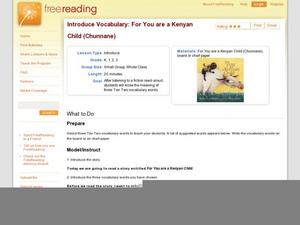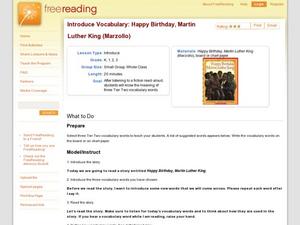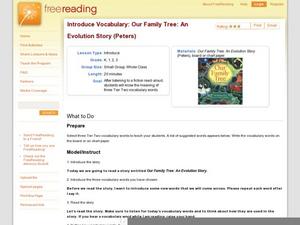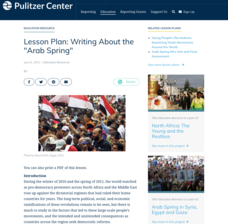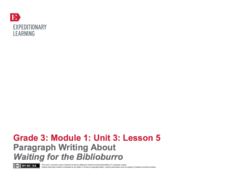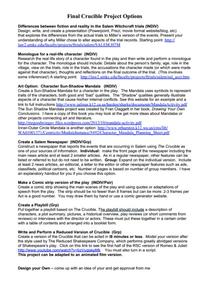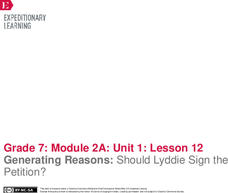Curated OER
Introduce Vocabulary: Clap Your Hands (Cauley)
Lorinda Cauley's book Clap Your Hands is a fun way to expand budding readers' vocabulary in context (although you could use any book for this strategy). To prepare kids, introduce the following terms before reading: dare, flap, frown,...
Curated OER
Introduce Vocabulary: Doctor DeSoto (Steig)
William Steig's story of a witty mouse couple will have scholars intrigued as they listen for new vocabulary words and context clues. Doctor DeSoto can be found on YouTube in case you don't have it. Emerging readers expand their...
Curated OER
Introduce Vocabulary: For You are a Kenyan Child (Chunnane)
Discover that Kenyan children aren't much different from your young scholars as they read Kelly Cunnane's story For You are a Kenyan Child. This story is an excellent resource for vocabulary in context, and introduces new words...
Curated OER
Introduce Vocabulary: Happy Birthday, Martin Luther King (Marzollo)
Looking for a vocabulary instructional activity relevant to MLK Day? Try this reading comprehension idea designed around Jean Marzollo's biography Happy Birthday, Martin Luther King. Go over new terms (freedom, justice,...
Curated OER
Introduce Vocabulary: I See Animals Hiding (Arnosky)
Animals are amazing at disguise! Explore the different ways they escape view as scholars learn vocabulary-in-context through Jim Arnosky's book I See Animals Hiding. Prepare pupils to raise their hands when they hear the words by...
Curated OER
Introduce Vocabulary: In the Small, Small Pond (Fleming)
Explore pond life and action words through Denise Fleming's In the Small, Small Pond, which you can find online if you don't have it on hand. Learners explore the following verbs: doze, hover, plunge, scatter, swoop, and wade. Go over...
Curated OER
Introduce Vocabulary: Lilly's Purple Plastic Purse (Henkes)
Familiarize budding readers with new vocabulary in context as they listen you read Lilly's Purple Plastic Purse, which can be found on YouTube if you don't have in on hand. Recommended focus words here are: considerate, creative,...
Curated OER
Introduce Vocabulary: Make Way for Ducklings (McCloskey)
Use the Caldecott Award-winning book Make Way for Ducklings by Robert McCloskey (which can be found on YouTube if you don't have it) to guide budding readers through vocabulary in context. Although the instruction here is limited to the...
Curated OER
Introduce Vocabulary: Matthew's Dream (Lionni)
Explore vocabulary in context with emerging readers using Leo Lionni's whimsical story Matthew's Dream, which you can find on YouTube if you don't have it. Kids expand their word base as you pre-teach the terms (appear, bleak, embrace,...
Curated OER
Introduce Vocabulary: One Tiny Turtle (Davies)
The loggerhead turtle is a fascinating species, and budding readers learn all about it in Nicola Davies' account One Tiny Turtle. This informational narrative offers excellent vocabulary in context, and you'll find guidance here to...
Curated OER
Introduce Vocabulary: Our Family Tree: An Evolution Story (Peters)
Lisa Peters presents macroevolution as a large-scale family tree in her book Our Family Tree: An Evolution Story. She suggests the process from single-celled organisms to modern-day humans, and learners explore new vocabulary through the...
Curated OER
Genre Lesson: Autobiography
Start kids thinking about point of view and autobiographies by telling them a short story about your morning (first person), and then asking a volunteer to re-tell the story to you (second person). There are tips to help you tie this...
Pulitzer Center
Writing About the "Arab Spring"
An information-rich resource, this webpage will provide your class with all the information they need to explore a relevant real-world and little understood topic: the Middle East and the people's revolutions that shook it in the spring...
EngageNY
Paragraph Writing About Waiting for the Biblioburro
Ask your learners to synthesize what they know about Waiting for the Biblioburro by writing a well-organized paragraph. Young writers focus on using transition words and including specific details in their paragraphs. The plan allows for...
Curated OER
Final Crucible Project Options
Finding and/or designing a menu of equally weighted synthesizing projects to end a unit can be a challenge. Simplify the task with this menu of individual and group projects meant to accompany a study of The Crucible. Presentations,...
Curated OER
Maniac Magee: A 5th Grade Literature Guide
There's no need to run around trying to plan a unit for the book Maniac Magee, the work has already been done for you. Through a series of whole class, small group, and independent lessons and activities, students practice synthesizing...
Thoughtful Education Press
Compare and Contrast
Encourage readers to compare and contrast the information that they find in informational text with a variety of reading passages and worksheets. Learners read all about subjects in science, social studies, and literature before...
EngageNY
Grade 9 ELA Module 2, Unit 3, Lesson 12
As the first in a two-part, end-of-unit assessment that encourages readers to synthesize the unit's main ideas, class members review their notes for each of the three texts they read and develop three open-ended discussion questions...
EngageNY
Grade 9 ELA Module 3, Unit 2, Lesson 12
Ninth graders synthesize their inquiry paths, research process, and claim formulation with a writing assessment at the end of the unit. Learners write a one-page perspective about their conclusions from the research process and outcomes...
Constitutional Rights Foundation
Conservation, Preservation, and the National Parks
Going green? Scholars investigate the creation of the US National Park program. Through diary entries as well as expert testimony, they synthesize information and analyze the need for conservation and preservation. Finally, they display...
College Board
2007 AP® English Language and Composition Free-Response Questions Form B
Do museums offer eyes into the past? Scholars synthesize sources to make a claim in an essay about the importance each museum artifact deserves. Pupils also write to analyze journalist level of ethics as well as a speech by Wendell...
College Board
AP® English Language Special Focus: Using Sources
What is the most effective way to teach scholars how to write a research paper? Educators explore the topic with the AP® English Language and Composition exam resource. The reference material guides teachers in best practices for using...
EngageNY
Generating Reasons: Should Lyddie Sign the Petition?
Scholars synthesize evidence from Katherine Paterson's Lyddie to create a list of the pros and cons of Lyddie signing a petition about working conditions. They use the Lyddie's Decision anchor chart to record their thoughts and ideas...
EngageNY
Analyzing the Features of an Informative Consumer Guide
Analyze, strategize, synthesize! Scholars analyze informative consumer guides to determine what features to include in their own guides. Next, pupils select charts and images to use in their guides.
Other popular searches
- Synthesize Reading Strategy
- Synthesize Information
- Synthesize Graphic Organizer
- Reading Synthesize
- Synthesize Reading Passages
- Synthesize Lesson Plan
- Comprehension Synthesize
- Synthesize Text
- Synthesize and Reading
- Music Synthesizers
- Synthesize Materials
- Synthesized Music




